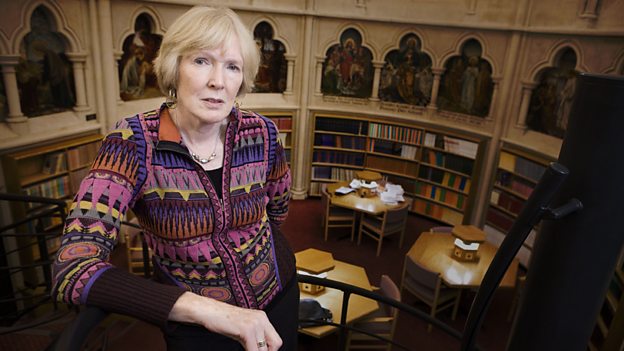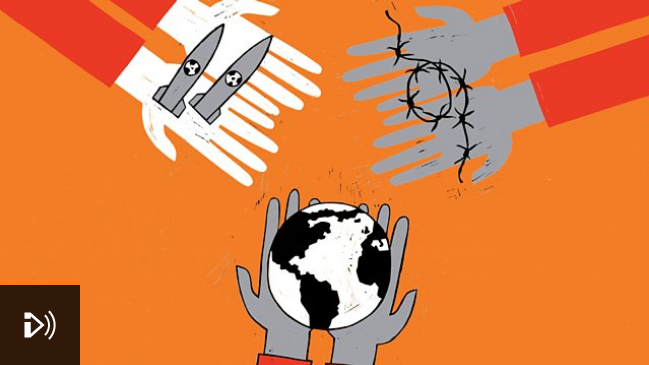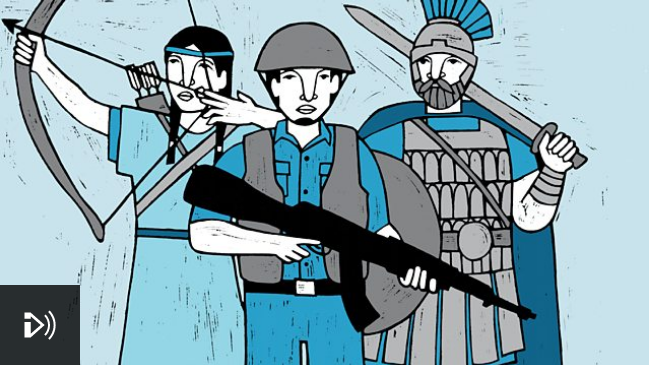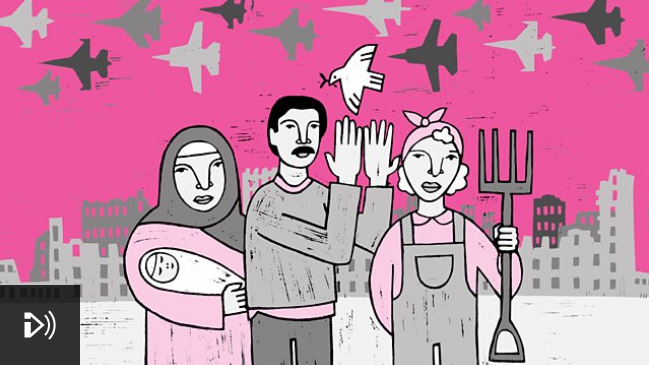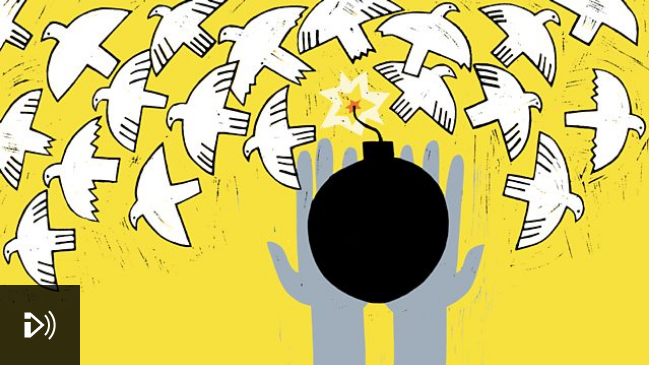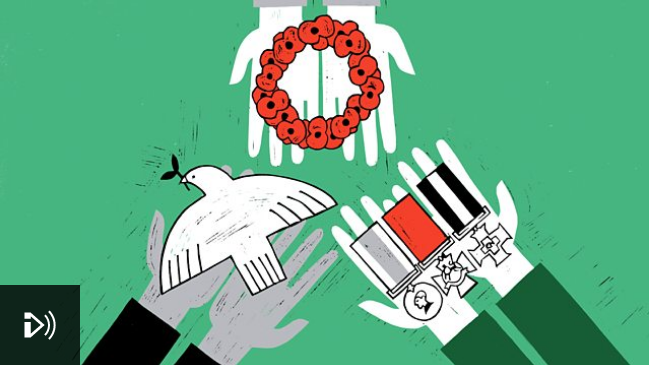UPCOMING EVENTS

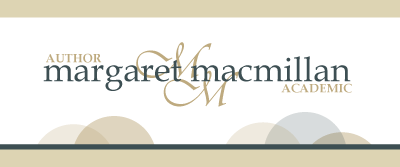
THE 2018 REITH LECTURES WITH MARGARET MACMLLAN: "THE MARK OF CAIN"
Professor Margaret MacMillan went on tour recording her Reith Lectures - entitled The Mark of Cain - in June 2018, beginning in London and concluding in Canada.
The five lectures exploring the tangled history of war and society and our complicated feelings towards it and towards those who fight, are now available on demand on Radio 4.
Professor MacMillan’s lectures were recorded before audiences in London at the BBC’s Radio Theatre, the University of York, the Sursock Museum in Beirut, Stormont in Belfast and at the Canadian War Museum, Ottawa, Canada. The presenter and chair was the journalist and broadcaster, Anita Anand. Her predecessor Sue Lawley stepped down after 17 years
Across her five lectures Professor MacMillan addressed the theme of war and humanity. She asked why groups, whether nations or religions or gangs, get into wars and why individual men and women fight. read more
WAR AND HUMANITY
Is war an essential part of being human? Are we destined to fight? That is the central question that historian Professor Margaret Macmillan addresses in five lectures recorded in the UK, Lebanon and in Canada. In her series, called The Mark of Cain, she will explore the tangled history of war and society and our complicated feelings towards it and towards those who fight.

FEARING AND LOVING: MAKING SENSE OF THE WARRIOR
Historian Margaret MacMillan asks why both men and women go to war. "We are both fascinated and repulsed by war and those who fight," she says. In this lecture, recorded at York University, she explores looks at the role of the warrior in history and culture and analyses how warriors are produced. And she interrogates the differences that gender plays in war. Anita Anand presents the programme recorded in front of an audience, including a question and answer session.

CIVILIANS AND WAR
Historian Margaret MacMillan dissects the relationship between war and the civilian. Speaking to an audience in Beirut, she looks back at the city's violent past and discusses the impact of conflict on noncombatants throughout the centuries. She explores how civilians have been deliberately targeted, used as slaves and why women are still often singled out in mass rapes. And she addresses the proposition that human beings are becoming less, not more violent. The programme is chaired by Anita Anand.

MANAGING THE UNMANAGABLE
Historian Margaret MacMillan assesses how the law and international agreements have attempted to address conflict. Speaking to an audience at the Northern Irish Parliament Buildings at Stormont in Belfast, Professor MacMillan outlines how both states and the people have sought to justify warfare - from self-defence to civil war - focusing on examples from Irish and British history. The programme, including a question and answer session, is presented by Anita Anand.

WAR'S FATAL ATTRACTION
Historian Margaret MacMillan looks at representations of war: can we really create beauty from horror and death? Speaking at the Canadian War Museum, she discusses the paradox of commemoration. She questions attempts to capture the essence and meaning of war through art. The programme is presented by Anita Anand in front of an audience and includes a question and answer session.
THE 2015 CBC MASSEY LECTURES | “HISTORY'S PEOPLE”
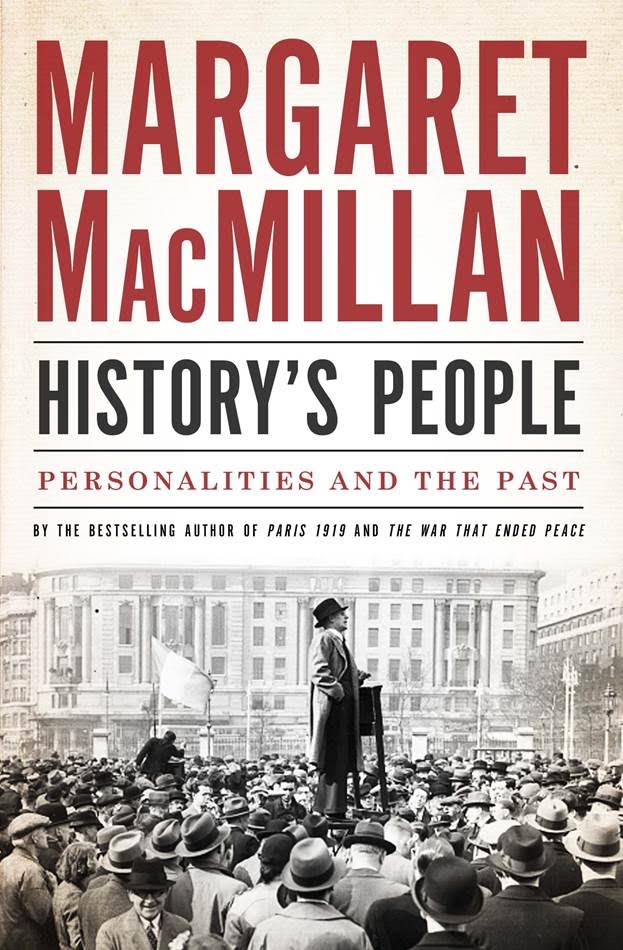
In the 2015 CBC Massey Lectures, renowned historian Margaret MacMillan explores some of the great people - good and bad, dreamers, explorers and adventurers - who have shaped their times and ours. One historian’s view of the people of the past who have intrigued, horrified or engaged her.
Some of these great figures have changed the course of history and even directed the currents of our time. Others are memorable for being risk-takers, adventurers, or observers. Margaret MacMillan looks at the concept of leadership through Bismarck and the unification of Germany; William Lyon MacKenzie King and the preservation of the Canadian Federation; Franklin Delano Roosevelt and the bringing of a unified United States into the Second World War.
Leaders can also make huge and often destructive mistakes, as in the cases of Hitler, Stalin, and Thatcher. Richard Nixon and Samuel de Champlain are examples of daring risk-takers who stubbornly went their own ways, often in defiance of their own societies. Then there are the dreamers, explorers, and adventurers, individuals like Fanny Parkes and Elizabeth Simcoe who manage to defy or ignore the constraints of their own societies. Finally, there are the observers, such as Babur, the first Mughal emperor of India, and Victor Klemperer, a Holocaust survivor, who kept the notes and diaries that bring the past to life.
History’s People is about the important and complex relationship between biography and history, individuals and their times.
PODCASTS
Foreign Affairs
Canada Files

Wiis
Women & Leadership: Breaking and Making Worlds
When wars end, non-war begins. Negotiations are held and treaties signed, and with luck peace follows. But that is not always the case.
Expeditions
Why War Happens
I don't think we're biologically programmed to go to war. What is extremely important is culture, and fighting war has been seen by many cultures as acceptable.

Doomsday Watch with Arthur Snell
Season Finale: Where Do We Go From Here?
In this series we’ve looked at under-reported threats to global stability, from the psychology of Xi Jinping to the coming water crisis to the War on Truth. But what happens next? In this extended end-of-season edition, Arthur Snell steps back to look at the big picture with experts in geopolitics, future warfare and the Chinese, Russian and American superpowers. Can the world pull itself from the brink – or is our Long Peace coming to an end?
CNN
An invented history': Experts unpack Putin's Ukraine fixation
Authors Peter Pomerantsev and Margaret MacMillan discuss how Vladimir Putin's view of historical ties between Ukraine and Russia informs the current standoff

Apple Podcasts: Reading our Times
How has war shaped us?
War seems to be omnipresent in human history and despite the number of people who have argued that the world is getting ever more peaceful, it remains a reality for millions of people today.
European Policy Centre
Talks Geopolitics
In an online exchange with Ricardo Borges de Castro, Associate Director and Head of the Europe in the World Programme at EPC, Professor MacMillan shed light on the changing nature of war and conflict, as well as on the role of history in shaping the present and the future. The discussion also touched upon the emerging rivalry between the United States and China, Europe’s role in it, and the long-term effects of the pandemic on the multilateral order.

The Documentary
When Kissinger went to China
In July 1971, Kissinger, then US National Security Advisor, made a clandestine visit to the People’s Republic of China – then America’s sworn enemy. At the time China was isolated from the outside world amidst the chaos of the Cultural Revolution. America was looking for a way out of the Vietnam war. Both countries had had no contact for over 20 years.
The Heartland Institute
Ill Literacy, Episode XXXIII: Stalin's War
In Episode XXXIII of Ill Literacy, Tim Benson talks with Sean McMeekin, author of “Stalin's War: A New History of World War II.”

H-Bomb
We Didn't Start the Fire: The History Podcast
The hydrogen bomb. A nuclear threat bigger and badder than any atomic bomb that came before it. How close did the USA and Soviet Union come to global annihilation during the Cold War? Very. And renowned historian and wonderful storyteller Margaret MacMillan is here to tell us why.
DELPHI ECONOMIC FORUM

CONFERENCE BOARD OF CANADA
War and Remembrance
November 11 is a time of reflection. A time to remember the struggles and sacrifice that have gone into building this country. Margaret MacMillan, bestselling author and professor of history, reminds us in her new book, War: How Conflict Shaped Us, that we are all shaped by war.
ISAIAH BERLIN MEMORIAL LECTURE
The 11th Isaiah Berlin Memorial Lecture "Isaiah Berin, History and the World of Today" delivered by Margaret MacMillan, an emeritus professor of international history at Oxford University and a professor of history at the University of Toronto

WRITERS FESTIVAL
War: How Conflict Shaped Us
Margaret Macmillan shares her insights into the very nature of war—from the ancient Greeks to modern times—with CBC’s Adrian Harewood.
FINANCIAL TIMES
Margaret MacMillan on war, its history and consequences
Gideon Rachman talks to historian Margaret MacMillan about her study of warfare through the ages and why she fears that, while the manner in which we wage war has changed, our propensityto stumble into conflict remains the same.

COUNCIL ON FOREIGN RELATIONS
John B. Hurford Memorial Lecture With Margaret MacMillan
Historian and author Margaret MacMillan discusses her new book War: How Conflict Shaped Us, including the evolution and intricacies of warfare as well as how war has influenced humanity and society over the course of history.
CNN
The Life and Legacy of Prince Philip
Historians Simon Schama and Margaret MacMillan discuss Prince Philip's childhood, his life as a royal and the legacy he leaves behind.

ARCHIVE ON 4
The Quebec Emergency
In October 1970, radical Quebecois nationalist violence threw Canada into political chaos. Margaret Macmillan traces the history of the tumultuous time.
THE NEXT PAGE
United Nations Library
In Episode 32, historian, author and professor of history, Margaret MacMillan, joins The Next Page to share some of her insights on the makings of multilateralism as we know it today.

CENTRE FOR INTERNATIONAL PEACE AND SECURITY STUDIES
Cold Wars
September 25, 2020: CIPSS hosted a book release roundtable for Lorenz Lüthi's new book, Cold Wars. Discussants include Margaret MacMillan, Deborah Larson, Fawaz Gerges and the moderator was Carl Bouchard.
COUNCIL ON FOREIGN RELATIONS
Living in History
Whether you think we are making history or repeating it, it’s safe to say we are living in a historic time. In this episode, Why It Matters asks three historians to weigh in on how to use the past to examine the present and make better choices for the future.

ECONOMIC AND SOCIAL RESEARCH COUNCIL
The Brexit Breakdown podcast kicks off with a new series starting with Margaret MacMillan, professor of international history and Warden of St Antony’s college at Oxford university. She has written many books ranging from the Women of the Raj, Nixon and Mao and The War that ended Peace. The discussion was led by Professor Anand Menon, director of The UK in a Changing Europe.
They discussed among other things, what the pandemic has shown us and why she is relatively optimistic about what the future might hold. How leaders can regain the trust of those they lead, and whether we can really learn the lessons of history.
IMPERIAL WAR MUSEUMS
Reimagining Victory: Mission Accomplished? Victory in the Age of Endless Wars
A panel including Jonathan Powell (former diplomat and negotiator of the Good Friday Agreement), Margaret MacMillan (historian and IWM Trustee) and Tarak Barkawi (Professor of International Relations, LSE) unpick the traditional concept of military victory and ask what it means to ‘win’ a war today, in an age of unending conflicts and protracted crises. The conversation is chaired by BBC’s Chief International Correspondent, Lyse Doucet

BBC RADIO | PRIVATE PASSIONS
Michael Berkeley’s guest for Armistice Day is 2018's Reith Lecturer and First World War specialist, Margaret MacMillan. The third of the sonic memorials for Remembrance Day follows
THE BRITISH ACADEMY
Is COVID-19 a turning point in history? Learning from the past
The course of human history has been shaped by war, disease and natural disaster. Whether the Black Death, world wars or COVID-19, these crises have sent shockwaves across the globe, with far-reaching social, political and economic consequences. In this event, distinguished historian Margaret MacMillan joins Hetan Shah to discuss major turning points in history, and how insights from the many and varied catastrophes of the past can help us to make sense of the present.

BBC RADIO | EUROPEANS: THE ROOTS OF IDENTITY
Historian Margaret MacMillan explores what has really shaped Europeans' identity.
BBC RADIO | DESERT ISLAND DISCS
Professor Margaret MacMillan, historian and Reith Lecturer in 2018, shares the eight tracks, a book and a luxury she'd want to take if cast away on a desert island.

BBC RADIO | GREAT LIVES
Mussolini
September 1943, and German troops have just landed in gliders to rescue Benito Mussolini from the mountain resort where he was being held. “I knew my friend Adolf Hitler would not desert me,” he said later. But Mussolini died before the end of the war, shot and then strung up with his mistress in Milan.
Who was this man, and is he still relevant today? Nominating him is Professor Margaret MacMillan, not as her hero but as someone she says must not be dismissed as a buffoon.
UN UNIVERSITY
Great Crises Through the Lens of History – Prof. Margaret MacMillan
On 7 September 2020, United Nations University hosted “Great Crises Through the Lens of History“, a virtual conversation with Prof. Margaret MacMillan, Professor of History, University of Toronto.

BBC RADIO | RETHINK
Margaret MacMillan: Rethinking International Cooperation
Historian MacMillan explains how our interdependence is essential to our condition
CENTENNIAL CONFERENCE
Margaret MacMillan, Keynote Address: AUP Paris Centennial Conference

THE NAKED SCIENTISTS
The changing face of human conflict.
We're asking whether war is a natural part of human society?

